Mary Anne Yarde's Blog: The Coffee Pot Book Club , page 114
November 18, 2019
Have you heard? Historical Fiction author, J.R. Rogers, has a fabulous new book — To Live Another Day #NewRelease @authorjrrogers
To Live Another DayBy J.R. Rogers

A powerful period flavor embellishes this intriguing novel replete with the shocking depravity rampant in the insular Portuguese enclave of Lourenço Marques, the neutral colonial capital of Portuguese Mozambique, during the early years of World War Two. It is June 1940 when, ahead of the Germans marching into Paris, Rudolf and Aleece Bamberger, a young German-French Jewish couple flee to Africa to wait out the war where they become embroiled in intrigue and espionage. Safe at last—or so it seems at first—the Bamberger’s are diverted to Lourenço Marques because of a U-boat threat rather than to Cape Town their original destination. Aleece, a French citizen, finds work at the British consulate while Rudolf, her German husband, but an emigrant to France before the war, drifts helplessly into the hands of the Abwehr spymaster, Ludwig Janke. The Nazi’s tentacles run deep through the tranquil colonial capital and his fearsome espionage operation soon ensnares Rudolf and threatens him into cooperating. With spy-thriller plotting, To Live Another Day vividly re-creates the skullduggery of Axis intelligence operatives from MI6, the OSS, the Abwehr and other services operating from this vast neutral harbor situated at the forefront of Indian Ocean shipping lanes.
Pick up your copy ofTo Live Another DayAmazon• Barnes and Noble
J.R. Rogers
 Born in Paris of American parents, J.R. Rogers is a writer who has lived and worked in southern California since the 1980s. He holds a degree in French literature and later studied short story writing at the University of California, Irvine. Fluent in French he has worked principally in quality management and as a writer for a number of firms in both Canada and the United States. His writing focus has been pre-World War II historical novels of espionage and intrigue set in little known and out of the way international locations. His latest novel is his third to be set in Africa—where he lived for three years in the Democratic Republic of the Congo. He began writing and publishing short stories in 1996 and since 2008 has written eight historical fiction novels and a number of short stories that have been published.
Born in Paris of American parents, J.R. Rogers is a writer who has lived and worked in southern California since the 1980s. He holds a degree in French literature and later studied short story writing at the University of California, Irvine. Fluent in French he has worked principally in quality management and as a writer for a number of firms in both Canada and the United States. His writing focus has been pre-World War II historical novels of espionage and intrigue set in little known and out of the way international locations. His latest novel is his third to be set in Africa—where he lived for three years in the Democratic Republic of the Congo. He began writing and publishing short stories in 1996 and since 2008 has written eight historical fiction novels and a number of short stories that have been published.
Published on November 18, 2019 20:00
November 17, 2019
Join #HistoricalFiction author, Mercedes Rochelle, as she explains what inspired her to write her fabulous book — Heir To A Prophecy @authorrochelle
As it turns out, connecting Banquo to King James Stewart was the whole purpose of the witches. So when the weird sisters told Banquo “Thou shalt ‘get kings”, they were talking over 500 years into the future! The witches, such an integral part of the play, were already embedded in Shakespearean society; much of that can be attributed to King James (also James VI of Scotland) who was pretty much responsible for the witch burning craze that infested Scotland in 1597. To this day I still don't understand why this would be a good plot device for Shakespeare. In fact, it is popularly thought that James was so displeased he banned the play for five years, though I can't find any credible documentation to support this speculation. However, it has also been suggested that the weird sisters (or wyrd sisters) were a manifestation of the Norns—the Norse goddesses who controlled our destiny, much like the Greek Fates. What did Shakespeare have in mind? Considering that paganism was alive and well in the 11thcentury, it's not really all that far-fetched. And indeed, this is the interpretation I chose for my novel. It was the Norns who set up a chain of events that placed the Stewarts on the throne. It made so much sense to me!I discovered a history called Cambria Triumphans, written by Percy Enderbie in 1661; it referred to the old legend, and from this came the plot of my novel. He told us about Fleance and "during his residence in the Welsh court, he became enamoured of Nesta, the daughter of Gruffydd ap Llewelyn; and violating the laws of hospitality and honour, by an illicit connection with her, she was delivered of a son who was named Walter." Aha! I struck gold. Little did I realize (until I was deep into my research) how many historical figures were actually related to Walter; on his mother’s side he was grandson of Gruffydd ap Llewelyn, Prince of Wales and Ealdgyth, daughter of Aelfgar, Earl of Mercia (and future queen of England); on his father’s side he was grandson of Banquo. He was a distant relation to Alain le Rouge, Count of Brittany and future Earl of Richmond. And, to fulfill his destiny, Walter was created the first Steward of Scotland, a hereditary post. Walter’s quest to unravel his legacy took him through many historical events like the Battle of Dunsinane, the Battle of Hastings, and Malcolm III's court, and gives us a rare look at eleventh century Scotland as well as King Malcolm's relationship with William the Conqueror.
I hadn't planned to write a historical novel, but by the time I figured it all out, my course was already charted. While researching this book I became fascinated with Earl Godwine and his family, which inspired me to write my “Last Great Saxon Earls” trilogy. All three books overlap this one, and Walter even makes a cameo appearance in “The Sons of Godwine”. This year I was able to regain my rights and publish a revised edition of “Heir To A Prophecy”. It was great fun to revisit my old friend.
Excerpt from Heir To A Prophecy
AmbushFleance barely slowed his step as Banquo stopped again, removing a rock from his shoe. He and his father were already late to the king's banquet, and a half mile still stretched between them and the castle gate. It had seemed like a fine idea a couple of hours ago, taking a walk to get away from that hostile environment. There had been too many uncomfortable pauses in conversation, too many unfinished phrases, too many sideways glances. But now, dusk was quickly deepening into night, and it was getting difficult to see into the forest. There was probably a spy in every tree, for all he could tell.The young man’s curly hair blew about his face as he looked up at the treetops. High cheekbones accentuated dark brown eyes as he raised his brows to see better through the shadows. His fine square chin gave him a profile he was proud of, and he went beardless, disregarding the current fashion. But his mouth, usually so prone to laughter, was pursed tonight in frustration.
"Blast this uphill climb," he grumbled as Banquo adjusted his cloak clasp. He glanced at his father wryly; this reticence was most unusual for him. His father grunted a response, but finally shifted his belt, shaking off his lethargy. Picking up their pace, father and son strode deep into the forest.
It was a quiet night, punctuated by the crunch of stones underfoot. Not a cricket was heard, nor birds, only the sigh of leaves rustling far overhead.
"It shall be rain tonight," Banquo said.
From behind came the cry: "Let it come down!"
In an instant, three dark forms were among them. Banquo was their main target, and two of them fell upon him, slashing the startled man in the face. The worthy lord was blinded by his own blood even as he shouted, "Villains, Murderers! Fly, Fleance, Fly!"
Though past his physical prime, the old warrior still was more than a match for both opponents. With a practiced motion, Banquo swept his sword from the scabbard, aiming an overhead cut at his nearest attacker's head. If the blow had hit, he would have cleaved the man's skull. But the blood was flowing so fast into his eyes that his aim was flawed. The blade only glanced off the other's shoulder, eliciting a howl of pain.
Enraged, the murderer dived at Banquo, catching him in the throat with a dagger. Letting go the knife, the man stepped back, clutching his arm; he was astounded that Banquo was still on his feet. For a moment, it seemed that their victim would respond with a last lunge. Then he staggered, gurgling, and collapsed into the arms of his murderers.
Fleance was already in motion before his father had shouted. Shoving his torch into the third assassin's face, he set the man's mask aflame. Screaming, clawing his face, the murderer went down, his feet kicked out from under him.
Fleance allowed himself a brief sneer. Then, wasting no more time, he moved toward the others when he saw the killers slashing Banquo's face. The boy hesitated, reluctant to abandon his father. But the assassins were too good at their work. Even from this distance he could tell that Banquo was already finished; his body gave no more sign of life.
It was also clear that their companion’s screaming made no impression on them; the assassins must have assumed that the victim was himself. Cursing, Fleance took advantage of the confusion. He stamped out his torch, kicked his assailant once more as the man was struggling up, and ran for his life.
Murder gave the forest a sinister cast. The trees seemed to bend their limbs before him, seeking to block his way. Fleance's breath came in short gasps, heightening the pain in his side as he ran frantically the way he had come.
His first thought was to go to Macbeth and raise a search party to ride down these outlaws. Then, a deeper, more telling conviction assailed him, though he knew not whence it came: perhaps the murderers were not there by chance. Perhaps they were paid assassins, in which case he could trust no one.
He considered, leaning against a tree and catching his breath. He wasn’t going anywhere without a horse, and both horses were still stabled at the castle. Going any closer to that accursed place was the last thing he wanted to do; however, he reminded himself that no one besides the assassins would know that there had been any trouble.
It was a risk. Perhaps they would lie in wait for him near the stables and finish the job. But he had a feeling that they would be too busy tending their wounds. Despite himself, Fleance smiled grimly.
He looked slowly around the tree and up the path. Everything was quiet. He took one step then another, resisting the urge to break into a run. This was no time to panic. He needed to keep his senses about him. He looked one more time in all directions, then began striding quickly toward the castle, hand on his dagger.
No one stopped him at the castle gate and Fleance went directly to the stabler’s door. He knocked quickly then stepped back, looking around. There was no indication he was being followed yet.
The stabler took his time answering, his face breaking into a scowl when he recognized Fleance; he hadn’t expected anyone to leave for some hours yet. But when the youth held out a penny, his mouth curled into a greedy sneer and he quickly came out, making the coin disappear as he passed.
Fleance watched him go into the stable, resisting the urge to shout at the other to hurry up. The man seemed to take an inordinately long time, then he came out—alone.
"What about t’other?"
"I only need one now. Is he ready?"
The man shrugged. "Whatever you want." He opened the stable door and Fleance sighed with relief to see that his horse was saddled. Without another word he mounted, offering no explanation for his hasty conduct and rode off, leaving the man scratching his head.
Pick up your copy of
Heir To A Prophecy
Amazon UK • Amazon US
Mercedes Rochelle
 Born in St. Louis MO with a degree from University of Missouri, Mercedes Rochelle learned about living history as a re-enactor and has been enamored with historical fiction ever since. A move to New York to do research and two careers ensued, but writing fiction remains her primary vocation. She lives in Sergeantsville, NJ with her husband in a log home they had built themselves.
Born in St. Louis MO with a degree from University of Missouri, Mercedes Rochelle learned about living history as a re-enactor and has been enamored with historical fiction ever since. A move to New York to do research and two careers ensued, but writing fiction remains her primary vocation. She lives in Sergeantsville, NJ with her husband in a log home they had built themselves.Connect with Mercedes: Website • Blog • Facebook • Twitter
Published on November 17, 2019 20:30
Join author Virginia King as she explores "When Folklore Wears a Modern Frock …" #amwriting #Folklore @selkiemoonbooks
Laying Ghosts

The prequel to Selkie’s journey Laying Ghosts is a standalone story about the chilling events that caused her to run away to Hawaii. As this story unfolded, I was influenced by a Russian folktale, a 1700s murder ballad and the Irish concept of a ghost. For readers interested in the folklore that inspired Laying Ghosts, I’ve written a companion collection of adult tales, Leaving Birds.
Giveaway

The novels in the Selkie Moon series are numbered in order: The First Lie, The Second Path, The Third Note, The Fourth Door.
Selkie’s next adventure will take her to Chile.
In the comments, put your suggestion for one word to create the title for Book Five:
The Fifth …??
All commenters will receive a free e-copy of Laying Ghosts and one winner will be chosen from the comments to also win an e-copy of the multi-award-winning The First Lie.
The First Lie
The Secrets of Selkie Moon,
Book 1
By Virginia King

Selkie Moon is a woman on the run.
Hawaii is her refuge …
Until the past comes knocking.
Thirty three years ago, Selkie Moon lost her mother – but why?
Then young Selkie began to feel things – invisible things. So her step-mother shut her in the bathroom until they were gone.
Now in a mad dash for freedom, Selkie has reclaimed her birth name and escaped her controlling family to rebuild her life in Hawaii with the help of some quirky new friends.
But her refuge begins to unravel until she’s running from something else entirely.
A voice in a dream warns: Someone is trying to kill you. At first Selkie dismisses it as just another nightmare. Then a woman’s face appears in her bathroom mirror, a mirror once owned by an old kahuna.
Entangled in local superstition and folklore, Selkie’s visions become so strange and frightening they begin to lift the lid on long-buried secrets.
What really happened on the beach thirty three years ago?
Why did Selkie's step-mother rename her Elkie?
And why won’t her father talk about it?
As her reality crumbles around her, Selkie’s instinct is to keep running. Because if she stays and begins to trust her long-forgotten psychic twinges, she’ll be forced to question every assumption her life is built upon.
And time is running out.
Thus begins a journey of self-discovery. As Selkie uncovers one secret after another, she must summon the courage and resourcefulness to survive each one.
And beyond her feelings of shock and betrayal, there may be unexpected redemption: to embrace the gift she’s forgotten, to understand the lies surrounding her childhood, to face the truth about herself and embrace the surprising new life that is calling her . . .
Pick up your copy ofThe First LieAmazon
Prefer Audio?Amazon
Laying GhostsThe Secrets of Selkie Moon

A strange message. A deserted beach house. A shocking incident from the past …
When a text message from a long lost friend lures Selkie Moon to Crystal Cottage, the chilling events from a house-party four years earlier wrap her in ghostly fingers and turn her life upside-down. Pick up your copy ofLaying GhostsAmazon
Published on November 17, 2019 19:30
November 15, 2019
#BookReview — Allegiance of Blood by Mark Turnbull #HistoricalFiction #CivilWar

Allegiance of Blood By Mark Turnbull
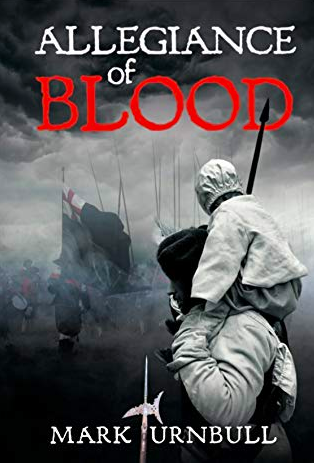
Sir Francis Berkeley strives to protect his wife and family from the brutal effects of the British Civil War. But aside from the struggle between king and parliament, the allegiances of family, friendship and honour entangle him at every turn and prove to be just as bloody.
As a witness to treason on the field of Edgehill, Francis is drawn into a fast-moving world of espionage and politics. Against a backdrop of some of the major battles and sieges, Francis’s fight to reunite his family opens up very different conflicts with which to contend.
Everything is at stake when the war comes to a little church one December morning. Can the family survive the parliamentarian onslaught as well as their own feud?

“Who speaks of peace at a time like this?”
The lèse-majesté of Parliament has led to this, or so says the King. The King’s rejection of the Nineteen Propositions led to this, the Roundheads counter. Regardless of whose fault it is, the die has been cast, and that tiny spark of defiance has lit an inferno. The fields are now soaked with English blood. The wounded and dying cry out for mercy. This is what Civil War looks like. Pym was right, who can speak of peace at a time like this?
Staunch Royalist, Sir Francis Berkeley, awakened to high-pitched shrieks and low tormented moans, but that was not all he heard as he lay wounded on the battleground of Edgehill. There is a traitor in their midst. A man who is intent on leaking information to the enemy. This man must be stopped. But what if that man turns out to be a friend? What then?
From the bloody aftermath of the Battle of Edgehill to the Church of St Lawrence at Alton, Allegiance of Blood by Mark Turnbull is the eloquent retelling of one of the darkest eras in English history.
Told from the viewpoint of both the Royalists and the parliamentarians, Allegiance of Blood is a monumental work of scholarship. The depth and scope of this book is not only impressive but vivid, compelling, and tautly gripping. The canvas is vast, but Turnbull has full control of his characters. Allegiance in Blood is an exhilarating adventure from start to finish.
Sir Francis Berkeley, the hero in this unforgettable tale, is a man of deep understanding and loyalty. He is the King's man, and yet there are times, especially when dealing with friends and family, where his conscience demands a more human touch than that of a hardened soldier. Through Francis' eyes, Turnbull has captured the very essence of what it must have been like to fight against your fellow countryman, to watch as your family is torn apart by conflicting allegiances and selfish ambition. Not only does Francis have to fight a war, but he is also ever mindful of the influence of his spiteful and poisonous mother-in-law who is determined to turn his wife against him. Turnbull has given his readers a character in Francis, whose realism is almost tangible. Brilliant!
There are many historical characters in this book. Turnbull has given as much care and attention to their detailing as he does to his protagonist — Francis. Amongst the horror and the filth of war, several characters captured my attention. Turnbull's portrayal of Prince Rupert of the Rhine was utterly sublime. Rupert's obstinate and sometimes arrogant nature counters his sharp intelligence and his military mind, which made this portrayal not only compelling but absolutely irresistible.
Another portrayal of a historical character that deserves my praise is that of John Pym. Turnbull has penned Pym exactly how I imagined him to be. Pym is steadfast in his beliefs, and his responsibilities lie heavy on his shoulders, especially when his own body is failing him. A wonderful depiction of one of the key figures of the English Civil War.
Likewise, Turnbull's portrayal of King Charles and Henrietta Maria, Queen consort of England, Scotland and Ireland was written with diligence and care. I thought they were masterfully portrayed, as was the young Prince James, Duke of York.
The historical detailing of this book has to be commended. Turnbull has very obviously devoted many hours to researching this era, the people who shaped this history, and the battles that saturated England's fields with the blood of her sons and daughters. But not only does Turnbull write about the war and the matters of state, he also depicts what the war was like for the ordinary citizens — how their world too was turned upside down by this war. The attention to detail and the very short chapters, certainly made this book an enthralling epic. Kudos, Mr Turnbull, your hard work has certainly paid off.
There are several famous battles in this book, but the one that stood out for me was the Storming of Bristol. Not only did Turnbull recount this battle with a historian's attention to detail, but he also described it with a novelist eye for the entertaining. Turnbull certainly knows how to keep his readers hooked.
If you are looking for your next great English Civil War Historical Fiction book, then look no further than Allegiance of Blood by Mark Turnbull. Fans of battle heavy fiction will undoubtedly love this book.
Review by Mary Anne Yarde.The Coffee Pot Book Club.
Pick up your copy ofAllegiance of BloodAmazon UK • Amazon US
Mark Turnball
 After a visit to Helmsley Castle at the age of ten, Mark Turnbull bought a pack of 'top trump' cards featuring the monarchs of England. The card portraying King Charles I fascinated him.
After a visit to Helmsley Castle at the age of ten, Mark Turnbull bought a pack of 'top trump' cards featuring the monarchs of England. The card portraying King Charles I fascinated him.Van Dyck's regal portrait of the King and the fact that he was executed by his own people were the beginnings of Mark's passionate interest in the English Civil War that has lasted ever since.
In the absence of time travel, he thoroughly enjoys bringing this period to life through writing. He has written articles for magazines, local newspapers and online educational sites. He has also re-enacted battles with The Sealed Knot and for several years edited the Historical Novel Society's online newsletter.
Connect with Mark: Website • Facebook.
Published on November 15, 2019 20:00
#BookReview — Allegiance of Blood by Mark Turnball #HistoricalFiction #CivilWar

Allegiance of Blood By Mark Turnball

Sir Francis Berkeley strives to protect his wife and family from the brutal effects of the British Civil War. But aside from the struggle between king and parliament, the allegiances of family, friendship and honour entangle him at every turn and prove to be just as bloody.
As a witness to treason on the field of Edgehill, Francis is drawn into a fast-moving world of espionage and politics. Against a backdrop of some of the major battles and sieges, Francis’s fight to reunite his family opens up very different conflicts with which to contend.
Everything is at stake when the war comes to a little church one December morning. Can the family survive the parliamentarian onslaught as well as their own feud?

“Who speaks of peace at a time like this?”
The lèse-majesté of Parliament has led to this, or so says the King. The King’s rejection of the Nineteen Propositions led to this, the Roundheads counter. Regardless of whose fault it is, the die has been cast, and that tiny spark of defiance has lit an inferno. The fields are now soaked with English blood. The wounded and dying cry out for mercy. This is what Civil War looks like. Pym was right, who can speak of peace at a time like this?
Staunch Royalist, Sir Francis Berkeley, awakened to high-pitched shrieks and low tormented moans, but that was not all he heard as he lay wounded on the battleground of Edgehill. There is a traitor in their midst. A man who is intent on leaking information to the enemy. This man must be stopped. But what if that man turns out to be a friend? What then?
From the bloody aftermath of the Battle of Edgehill to the Church of St Lawrence at Alton, Allegiance of Blood by Mark Turnball is the eloquent retelling of one of the darkest eras in English history.
Told from the viewpoint of both the Royalists and the parliamentarians, Allegiance of Blood is a monumental work of scholarship. The depth and scope of this book is not only impressive but vivid, compelling, and tautly gripping. The canvas is vast, but Turnball has full control of his characters. Allegiance in Blood is an exhilarating adventure from start to finish.
Sir Francis Berkeley, the hero in this unforgettable tale, is a man of deep understanding and loyalty. He is the King's man, and yet there are times, especially when dealing with friends and family, where his conscience demands a more human touch than that of a hardened soldier. Through Francis' eyes, Turnball has captured the very essence of what it must have been like to fight against your fellow countryman, to watch as your family is torn apart by conflicting allegiances and selfish ambition. Not only does Francis have to fight a war, but he is also ever mindful of the influence of his spiteful and poisonous mother-in-law who is determined to turn his wife against him. Turnball has given his readers a character in Francis, whose realism is almost tangible. Brilliant!
There are many historical characters in this book. Turnball has given as much care and attention to their detailing as he does to his protagonist — Francis. Amongst the horror and the filth of war, several characters captured my attention. Turnball's portrayal of Prince Rupert of the Rhine was utterly sublime. Rupert's obstinate and sometimes arrogant nature counters his sharp intelligence and his military mind, which made this portrayal not only compelling but absolutely irresistible.
Another portrayal of a historical character that deserves my praise is that of John Pym. Turnball has penned Pym exactly how I imagined him to be. Pym is steadfast in his beliefs, and his responsibilities lie heavy on his shoulders, especially when his own body is failing him. A wonderful depiction of one of the key figures of the English Civil War.
Likewise, Turnball's portrayal of King Charles and Henrietta Maria, Queen consort of England, Scotland and Ireland was written with diligence and care. I thought they were masterfully portrayed, as was the young Prince James, Duke of York.
The historical detailing of this book has to be commended. Turnball has very obviously devoted many hours to researching this era, the people who shaped this history, and the battles that saturated England's fields with the blood of her sons and daughters. But not only does Turnball write about the war and the matters of state, he also depicts what the war was like for the ordinary citizens — how their world too was turned upside down by this war. The attention to detail and the very short chapters, certainly made this book an enthralling epic. Kudos, Mr Turnball, your hard work has certainly paid off.
There are several famous battles in this book, but the one that stood out for me was the Storming of Bristol. Not only did Turnball recount this battle with a historian's attention to detail, but he also described it with a novelist eye for the entertaining. Turnball certainly knows how to keep his readers hooked.
If you are looking for your next great English Civil War Historical Fiction book, then look no further than Allegiance of Blood by Mark Turnball. Fans of battle heavy fiction will undoubtedly love this book.
Review by Mary Anne Yarde.The Coffee Pot Book Club.
Pick up your copy ofAllegiance of BloodAmazon UK • Amazon US
Mark Turnball
 After a visit to Helmsley Castle at the age of ten, Mark Turnbull bought a pack of 'top trump' cards featuring the monarchs of England. The card portraying King Charles I fascinated him.
After a visit to Helmsley Castle at the age of ten, Mark Turnbull bought a pack of 'top trump' cards featuring the monarchs of England. The card portraying King Charles I fascinated him.Van Dyck's regal portrait of the King and the fact that he was executed by his own people were the beginnings of Mark's passionate interest in the English Civil War that has lasted ever since.
In the absence of time travel, he thoroughly enjoys bringing this period to life through writing. He has written articles for magazines, local newspapers and online educational sites. He has also re-enacted battles with The Sealed Knot and for several years edited the Historical Novel Society's online newsletter.
Connect with Mark: Website • Facebook.
Published on November 15, 2019 20:00
November 14, 2019
A Conversation with Historical Fiction writer, Annette Valentine #amwriting #HistoricalFiction @annette_author
A Conversation with Historical Fiction writer, Annette Valentine.

Mary Anne: Welcome Annette to The Coffee Pot Book Club! Before we begin, please tell us a little about who you are and what you write.
 Annette: I’m Annette Valentine, author of the Southern historical fiction novel, "Eastbound From Flagstaff." I love writing and the research and hard work that goes into becoming a published author. It is such a creative and rewarding career, and it follows my 34-year career as a professional interior designer. Both creative endeavors have given me a deep sense of accomplishment and both have allowed me to invest God-given talents and in turn to see how the results are enhancing the lives of other people.
Annette: I’m Annette Valentine, author of the Southern historical fiction novel, "Eastbound From Flagstaff." I love writing and the research and hard work that goes into becoming a published author. It is such a creative and rewarding career, and it follows my 34-year career as a professional interior designer. Both creative endeavors have given me a deep sense of accomplishment and both have allowed me to invest God-given talents and in turn to see how the results are enhancing the lives of other people.I’m the mother of a son and daughter, and the grandmother of six too-quickly-growing-up grandchildren. My husband and I happily reside in Brentwood, Tennessee.
Mary Anne: What inspired you to write "Eastbound From Flagstaff”?
Annette: My father’s life—actually the life he lived that I knew very little about—was the inspiration for writing a story set in the 1920s. I wanted to find the man that deserved my honor, and I launched an all-out search to learn more about him. Originally, the story was going to be a different one, set in a much later time period—the 1960s. By happenstance, I was redirected to change it to the young life of Simon Hagan.
Mary Anne: What were the challenges you faced in researching this period of history?
Annette: I love architecture, so I wanted to include as many possible landmarks as I could in the locations depicted in the novel. From a small town in Kentucky to Detroit to Albuquerque, the places had to come alive on the pages of my book. That meant finding every detail to bring into view for my reader the building’s character—its flavor and its flair. I’ve not been to but one of the buildings. Even so, I feel like I’ve made them come to life because of research. Whether a challenge or an adventure—I loved thejourney!
Mary Anne: There are many books set in the 1920s. Can you tell us three (3) thingsthat sets your novel apart?
Annette: "Eastbound From Flagstaff" is intensely personal. I sincerely believe the reader gets a valuable opportunity to walk alongside an intenselyfascinating young man living in the 20s, and, in walking the walk, the reader has a unique opportunity to embrace a relationship beyond a storybook character. That’s two!
"Eastbound" is more than 1920s entertainment. It’s undergirded with a richand meaningful message. Simon Hagan’s the main character. He’s real. Hedoes a lot of living that’s imbued with inspiration. And who can’t useinspiration for living?
So: personal, relational, inspirational.
Mary Anne: It has been so wonderful talking you today. One last question, can you tell us what you are currently working on?
Ah! So glad to be able to say that I just last week completed the manuscript for the second novel in the My Father Trilogy: "Down to the Potter’s House." This is the story of two distinctly different patriarchal influences and the legacy that is passed down. It is a continuation of Simon Hagan’s life with the introduction of the person who will change his direction for-ev-a!
Eastbound from Flagstaff

A love story based on the author's father, Eastbound From Flagstaff portrays an individual who comes to recognize the significance of family, loyalty, and the richness of his heritage.
Simon Hagan is running from a lie, intent on believing his own efforts and perseverance can overcome anything. He abandons roots that are his foundational strength and hides behind his charm, living every moment as if life’s daring him to fail―again. He’s reckoning with his father’s God who could have delivered better outcomes but didn’t.This first installment in an epic trilogy that begins in the 1920’s, unique in its purposeful illumination of the human condition and its ideological indifference to God, asks the question: “Why was God silent when I needed him?” Simon’s return to the notion of forgiveness is the catalyst for a new beginning as it reunites Simon to the place he once thought was the impossible dream. The answer for Simon isn’t blowing in the backwinds of his dream chase; rather, it unfolds in the outstretched hand of a villain.
Pick up your copy ofEastbound from FlagstaffAmazon UK • Amazon US
Annette Valentine
 Annette Valentine is an inspirational storyteller with a flair for the unexpected. She graduated with distinction from Purdue University and founded an interior design business which spanned a 34-year career in Lafayette, Indiana and Brentwood, Tennessee.
Annette Valentine is an inspirational storyteller with a flair for the unexpected. She graduated with distinction from Purdue University and founded an interior design business which spanned a 34-year career in Lafayette, Indiana and Brentwood, Tennessee.Her design expertise went from the White House to a Habitat For Humanity house to the house next door with everything imaginable in between. Annette advocates for victims and survivors of human trafficking and speaks in public forums in an effort to raise awareness on issues which might preclude the joy of abundant life. She currently resides in Brentwood, Tennessee.
Published on November 14, 2019 20:00
November 13, 2019
Join me in Conversation with author, Diedra Drake #mythology #fiction @DiedraDrake
1000 years ago the Elves nearly destroyed their species through war. As punishment, their ancestors cursed them and trapped them on the Earthly plane.
Priscilla Forester is a 500-year-old Cursed Elf, with abilities far different from most. She knows there is some secret about her origins, but has given up thinking she will ever discover the truth.
However, Fate was only waiting for the right moment to reveal its secrets. As Priscilla and her lovers battle against warring Elf Houses, her true nature begins to emerge, and it is more than anyone had bargained for.
Pick up your copy ofCursed by FuriesAmazonRead for FREE with
Diedra Drake
 Diedra Drake is a life-long student of mythology and history, with a particular interest in the ways that different cultures tell the same stories using name variations. She is competent in classical Latin, and enjoys reading the classics – particularly Homer, Plutarch, and Shakespeare. For relaxation, Diedra loves to crack open a new historical romance novel or binge a new series on streaming.
Diedra Drake is a life-long student of mythology and history, with a particular interest in the ways that different cultures tell the same stories using name variations. She is competent in classical Latin, and enjoys reading the classics – particularly Homer, Plutarch, and Shakespeare. For relaxation, Diedra loves to crack open a new historical romance novel or binge a new series on streaming. After a couple of decades being a business owner in the technology industry, she decided to explore her other interests through the creation of a mythic fantasy romance world. She lives in Central Texas with her family, which includes a small cat colony and a couple of dogs, and tries to ensure she gets a daily serving of ice cream for continual inspiration.
Connect with Diedra: Website • Twitter • Instagram • Goodreads• BookBub • Facebook.
Published on November 13, 2019 21:00
What happened to the Trojans? #Folklore #Britain #Cornwall
The First Inhabitants of BritainBy Mary Anne Yarde
Who were the first inhabitants of Britain...?
Today we are going to look at Albion, and the best way to do that is through storytelling. So come with me, if you will, and travel back in time for a few minutes...
The City of Troy has been sacked. The once glorious kingdom is on fire, and those who survived the massacre now find themselves in bondage. Their fate? They are to be taken to Greece and sold at the slave markets.
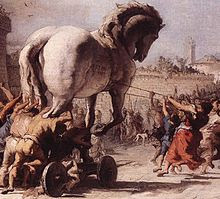 The Procession of the Trojan Horse in Troy by Domenico Tiepolo (1773).
The Procession of the Trojan Horse in Troy by Domenico Tiepolo (1773).Time takes care of everything, and as the years rolled by, people died, children were born, and they began to forget their Trojan heritage.
They all forgot. All bar one…
Some things cannot be swept away and forgotten. Brutus felt his Trojan heritage running through his veins. He was not content to spend the rest of his days a slave. He reminded his comrades who they were. Brutus encouraged rebellion against their Greek masters. The rebellion was a success and the Trojans, determined to keep hold of their freedom, ran away.
Brutus was granted an audience with the goddess Diana, and she told Brutus…
“Brutus! there lies beyond the Gallic boundsAn island which the western sea surrounds,By giants once possessed, now few remainTo bar thy entrance, or obstruct thy reign.To reach that happy shore thy sails employTheir fate decrees to raise a second TroyAnd found an empire in thy royal line,Which time shall ne’er destroy, nor bounds confine…”
Geoffrey of MonmouthThe History Of The Kings of Britain
Brutus had led his fellow countryman to freedom, and because of that, these men would follow wherever Brutus led.
They crossed the sea and looked upon the mighty white cliffs of a country known as Albion. And they knew, deep down in their hearts, that this island was destined to be theirs.

“The island was then called Albion, and inhabited by none but a few giants. Notwithstanding this, the pleasant situation of the places, the plenty of rivers abounding with fish, and the engaging prospect of its woods, made Brutus and his company very desirous to fix their habitation in it…”
All they had to do was rid the island of the Giants. Something easier said than done. But these Trojans had rediscovered the warrior blood that ran in the veins. They were not going to be defeated by a few Giants. The Trojans rounded up the Giants and herded them to Cornwall. The Giants had nowhere left to run. It was time to fight if they wanted to keep their kingdom. The largest and most fearsome of giants was Gogmagog, and he had had enough. He was so angry with these Trojan invaders that he stamped his feet until the rocks shattered and turned to tin.
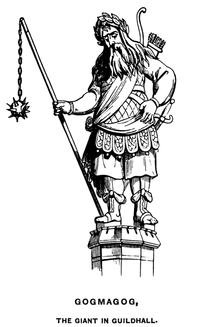
There was a Trojan’s general, who was a brave and fierce warrior. Gogmagog did not scare him. It was decided that Corineus and Gogmagog would fight in single combat. Whoever won, kept the kingdom.
Gogmagog and Corineus battled it out all day. Gogmagog had the advantage of height and strength, but Corineus was quick, and he picked up that giant and flung him over the edge of a cliff. Gogmagog was dashed “into a thousand fragments.”
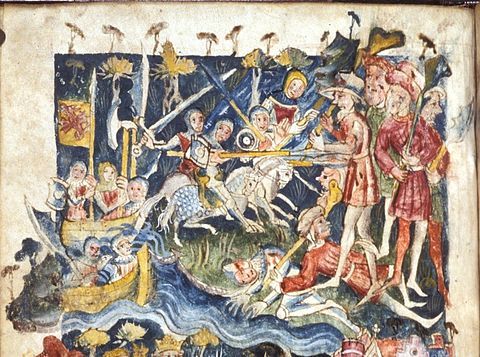 Combat between Brutus's troops and the giants led by Gogmagog.
Combat between Brutus's troops and the giants led by Gogmagog.As a reward, Brutus gifted Cornwall to Corineus. The Trojans divided the rest of the island up amongst themselves… Brutus named their newly conquered kingdom after himself. He called it Britain. And the rest, as they say, is history.
You may be wondering where the name “Albion” came from in the first place. You may not, but I am going to tell you anyway...!
It is said that a great Greek King married his thirty daughters into noble houses, but the princesses did not want to be married. Their husbands would not rule them. So, they plotted against them. The youngest sister did not want to be a part of this uprising, so she betrayed them. The sisters were punished. They were confined to a rudderless ship and set adrift. Three days later they found themselves in England. Albina was the first sister to set foot on English soil, so she named the country after herself. She called it Albion.
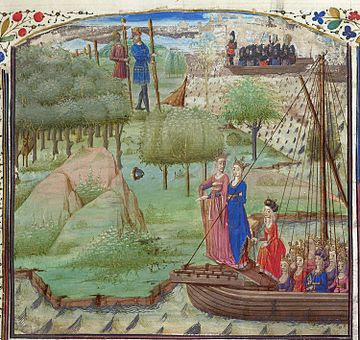 Albina and other daughters of Diodicias.
Albina and other daughters of Diodicias.Two giants of Albion are in the background, encountered by a ship carrying Brutus and his men.
Unfortunately for Albina and her sisters, there were no men on Albion, and after a time, the women became lonely. Whether they were tricked, we will never know, but these women lay with Incubus — demons that take on the forms of man. The sisters birthed a race of giants. And they would have lived happily ever after if the Trojans hadn’t landed on their shores! Monty Python famously said, "No one expects the Spanish Inquisition," But then, no one expects the Trojan army either!
Mary Anne Yarde
 Mary Anne Yarde is the multi award-winning author of the International Bestselling Series — The Du Lac Chronicles. Set a generation after the fall of King Arthur, The Du Lac Chronicles takes you on a journey through Dark Age Britain and Brittany, where you will meet new friends and terrifying foes. Based on legends and historical fact, The Du Lac Chronicles is a series not to be missed.
Mary Anne Yarde is the multi award-winning author of the International Bestselling Series — The Du Lac Chronicles. Set a generation after the fall of King Arthur, The Du Lac Chronicles takes you on a journey through Dark Age Britain and Brittany, where you will meet new friends and terrifying foes. Based on legends and historical fact, The Du Lac Chronicles is a series not to be missed.Mary Anne is the founder of The Coffee Pot Book Club. She has been a professional reader since 2016 and in this time Mary Anne has reviewed many books for the big and small publishing houses, as well as books penned by her fellow indie authors. Mary Anne is also an editorial reviewer for The Coffee Pot Book Club. Mary Anne has been a judge for a prestigious Historical Fiction Book Award for the last three years, as well as being a Top Reviewer on Netgalley.
Born in Bath, England, Mary Anne Yarde grew up in the southwest of England, surrounded and influenced by centuries of history and mythology. Glastonbury — the fabled Isle of Avalon — was a mere fifteen-minute drive from her home, and tales of King Arthur and his knights were part of her childhood.
You can contact Mary Anne by email:
author@maryanneyarde.com
If you would prefer to chat on social media, then you can find Mary Anne on Twitter and Facebook.
Published on November 13, 2019 20:00
November 12, 2019
Check out Brook Allen's fabulous #NewRelease — Antonius: Second in Command #AncientRome #HistoricalFiction @1BrookAllen
Antonius: Second in CommandBy Brook Allen
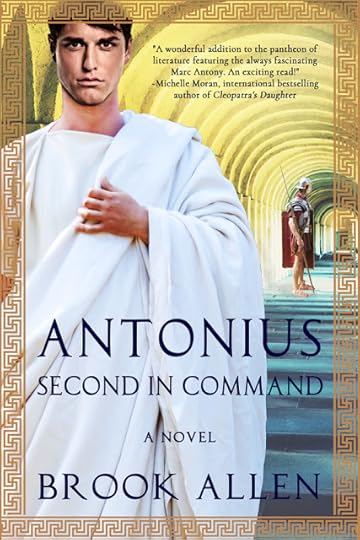
The Antonius saga continues…
Having proven himself as a formidable cavalry commander, Marcus Antonius finally earns a position at his kinsman Julius Caesar’s side. However, Caesar is an exacting general, demanding complete allegiance from his staff, even when his decisions put him at odds with the Senate. Marcus’s loyalty to Caesar comes at a cost, and he soon finds himself embroiled in mob violence and military mutinies. As civil war brings Rome’s Republic crashing down, many a relationship is torn asunder, including Marcus’s marriage. Determined to rise triumphant in Rome’s new era, Marcus faces his fears, his failures, and his enemies—not the least of whom is himself.
Amid the crisis of the Ides of March, Marcus must don the mantle of ruthlessness to carve his own legacy in Rome’s history. Enemies have been made, wills have been read, and heirs proclaimed.
But in Rome’s civil unrest, blood answers only to blood.
Amazon
Antonius: Son of RomeBy Brook Allen
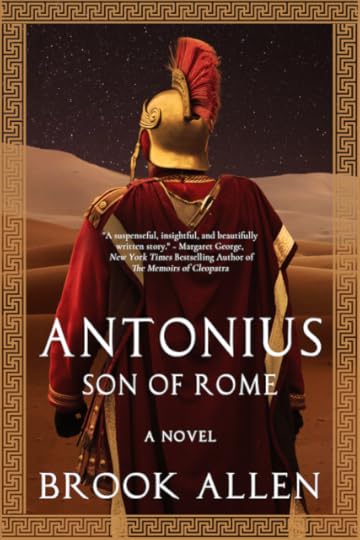
For over two thousand years, Marc Antony has been one of history’s most controversial men. His story was buried with him and written by his enemies. Now his entire saga is revealed in a compelling trilogy by Brook Allen.
After young Marcus Antonius’s father dies in disgrace, he yearns to restore his family’s honor during the final days of Rome’s dying Republic. Marcus is rugged, handsome, and possesses abundant military talent, but upon entering manhood, he falls prey to the excesses of a licentious society. His whoring, gambling, and drinking eventually reap dire consequences. After a series of personal tragedies, Marcus must come into his own through blood, death, and sacrifice. Once he finally earns a military commission, he faces an uphill battle to earn the respect and admiration of soldiers, proconsuls, and kings. Desperate to redeem his name and carve a legacy for himself, he refuses to let warring rebels, scheming politicians, or even an alluring young Egyptian princess stand in his way.
Amazon
Brook Allen
 Brook Allen is a Music Educator in a rural community near Roanoke, VA. Aside from her regular classes, she teaches two ensembles, a Chorus and Recorder Consort. Born in Salt Lake City, UT, Brook was raised in Omaha, Nebraska and has lived all over the U.S., from the Pacific Northwest, all the way down to Florida. She graduated with a B.A. in Music Education and has a M. A. in Liberal Studies, with an emphasis on Roman History. Brook is happily married and has two energetic Labrador Retrievers. Voraciously active, she cycles, hikes, and loves to travel.Connect with Brook: Website • Twitter • Facebook.
Brook Allen is a Music Educator in a rural community near Roanoke, VA. Aside from her regular classes, she teaches two ensembles, a Chorus and Recorder Consort. Born in Salt Lake City, UT, Brook was raised in Omaha, Nebraska and has lived all over the U.S., from the Pacific Northwest, all the way down to Florida. She graduated with a B.A. in Music Education and has a M. A. in Liberal Studies, with an emphasis on Roman History. Brook is happily married and has two energetic Labrador Retrievers. Voraciously active, she cycles, hikes, and loves to travel.Connect with Brook: Website • Twitter • Facebook.
Published on November 12, 2019 20:00
November 11, 2019
Join Historical Romance author, Penny Hampson, as she takes a look at Lord Torrington and His Tours Round Britain #History @penny_hampson
Lord Torrington and His
Tours Round Britain.
By Penny Hampson
 Colonel John Byng, otherwise known as Lord Torrington (1743-1813).
Colonel John Byng, otherwise known as Lord Torrington (1743-1813).As a writer of historical novels, I try to do as much research as possible to ensure my stories feel authentic and of their time. This means reading lots of material created in or around the period in which my stories are set. Some of my favourite sources of information are letters and diaries — they not only tell you about events and daily life in the time they were produced, but also give invaluable, and sometimes unintentional, insights into the personalities of their authors.
The journals of Colonel John Byng, otherwise known as Lord Torrington (1743-1813), have been a great resource for me, particularly with regard to the towns and villages of England.
John Byng liked to travel, you see, and spent a portion of each year touring the country. His early career began in the army, where he was a lieutenant-colonel in the 1st Foot Guards (Grenadier Guards), but after leaving the army, he secured a post in the Stamp Office of the Inland Revenue, an occupation that required him to live in London. As he himself put it, his ‘early days were spent in Camps, His latter days were pass’d at Stamps’.
But John Byng preferred the countryside, so each year he escaped the capital for a time, to travel and explore. Another interesting fact about Byng is that he didn’t stay in the great country houses, even though his nieces had connections to Woburn, Weston Park, and Longleat. Byng stayed in local inns and taverns along his self-devised itineraries, and it is his descriptions of these that I find fascinating. Byng’s notebooks were first published as the Torrington Diaries in the 1930s, and I am fortunate to have a later, abridged edition, Rides Round Britain, which are accounts of fourteen of his journeys.

Byng’s journeys were all undertaken on horseback, usually accompanied by a friend, or a manservant. It was the manservant’s job to look after the luggage, see to the horses, and ensure his master had the comforts of hot water, clean linen, and fresh clothes along the way. It was usual too, for the manservant to ride on ahead to arrange lodging and meals, ensuring his master acquired a superior bedroom and a private parlour at an inn. Being able to afford a manservant demonstrated that, even though he chose to travel on horseback, unlike many of his contemporaries who preferred the comforts of a private coach, Byng was a man of consequence.
Why did he choose to travel this way, and only in Britain? Byng enjoyed the out door life and thought he would not discover everything of interest from the enclosed comfort of a chaise. He also believed that there were as many interesting and picturesque places to see in Britain as there were on the Continent. ‘Talk not… of foreign parts, till you have seen and learnt something of your own country.’
At the time Byng was undertaking his tours, tour writing was becoming something of a fashion. He himself was surprised that he was ‘a man of mode’ by writing accounts of his travels. His purpose in recording was not to make a name for himself, but that ‘it may be the means of informing ignorant owners of what treasures of antiquity they possess and of stimulating them to the proper pride of guarding and preserving those remaining monuments of religion and grandeur which have escaped the ravages of reformation and civil wars and the yet more barbarous neglect of tasteless masters.’I feel that, if he were alive today, Byng would still find plenty to keep him occupied in trying to preserve the treasures of the past from the depredations of developers.
He also has a more practical aim for his travel journals.
‘Most modern Tours are written (in my mind) too much in the style of pompous history; not dwelling sufficiently upon the prices of provisions, recommendations of inns, statement of roads, etc., so that the following travellers reap little benefit from them.
We learn a lot about all these aspects of travel through reading Byng’s account.
He also had something to say about the nation’s morals - ‘I proceeded very slowly to Bedfont and there dined at a table cover’d with cold ham, veal and beef; which gives a strong idea of a nation’s gluttony and waste (from such quantities of victuals being found at an alehouse) and that all its hopes and wishes are fixed on beef and beer.’
There is also lots of incidental information about inns and their comforts and discomforts. In July 1782 Byng was staying in Bibury, Oxfordshire sharing a room with one of his travelling companions, a Mr Reynolds: ‘Mr Reynolds and I lay in the same chamber and, till he began to snore, we commented on the character and behaviour of our comrade, who overheard thro’ a slight partition every word we utter’d and repeated it to us this morning.’
Thin walls can get you into trouble! Happily, their companion ‘took it all with excellent good humour.’
At the same inn, he enjoyed a breakfast and ‘two fine basins of snail tea.’ Apparently, this unappetising concoction was indeed made from snails, and thought to be effective for those suffering consumption or fever.

On another tour in 1788, Byng visits Rye ‘like other maritime towns, it smells of fish and punch.’ A telling description. He’s not so lucky with the inn there. ‘I came to the George, a dirty seaport inn with a wretched stable.’ His companion on this trip is so unhappy with the accomodation that they decide to move on to Winchelsea, where Byng looks for bedrooms ‘and found two excellent ones and a good parlour’ at the New Inn.

Very helpfully, Byng includes a list of the charges for his stay:
Supper — 2 shillingsBreakfast — 1 shilling 4 penceDinner —2 shillingsSupper — 2 shillingsBreakfast —1 shilling 4 penceWine — 7 shillings 6 penceBrandy — 1 shillingBeer and porter — 10 penceLodging — 2 shillingsHorse — 3 shillings 3 penceTotal — 1 pound 3 shillings and 3 penceDo note the amount spent on alcohol!
Byng’s character jumps out in his journals, in his witty asides and pithy descriptions. Here is his description of asking for directions: ‘I was principally directed to the blacksmith’s shop, whence the Old Vulcan came out as grey and hairy as any badger. He order’d me to turn to the left, to turn to the right and to turn so often that he forgot himself. However, I obey’d his first turn, and there found a better guide, a direction post…’
I hope I’ve whetted your appetite for reading Byng’s journals and I’ll leave the final words to Byng, happy to be home at the end of his journey to North Wales in 1793.‘My evening was pass’d in unpacking, arranging my stable, etc. Then I had a well dress’d, roasted fowl for supper, with a nice currant tart, good bread, good cheese, fruit and a decent pint of port wine, with no headache following.’
SourcesRides Round Britain, John Byng, Viscount Torrington, edited by Adamson, Donald, The Folio Society, London, 1996John Byng, The Torrington Diaries: Containing the tours through England And Wales of the Hon. John Byng (Later Fifth Viscount Torrington) between the years 1781 and 1794: http://www.visionofbritain.org.uk/travellers/Byng
An Officer’s VowBy Penny Hampson
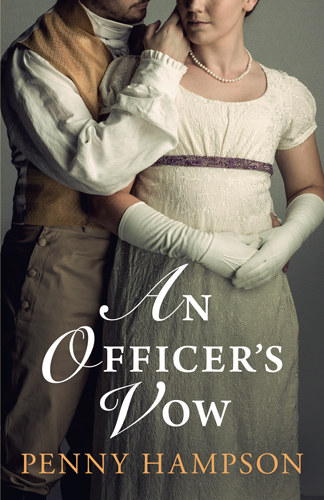
The future looks bleak to Major Nate Crawford. Depressed after being sent home from the Peninsular Campaign as unfit for service, he contemplates ending it all. Then an unexpected opportunity for adventure beckons in the shape of a delightfully intriguing runaway heiress. He will prove his worth as an officer and a gentleman by offering his help. He has a plan…
Lottie Benham is desperate. Her life is in danger and she needs a place of safety until her next birthday. The unexpected proposal from this attractive, but intimidating officer could be the answer to her prayers. Not normally a risk-taker, she decides to gamble all by placing her trust in this charismatic gentleman, who she suspects might be more in need of help than she.But the best laid plans…
Caught up in conflict, danger, and deception, will Lottie and Nate survive to find the perfect solution to their problems?
Amazon UK • Amazon US
Penny Hampson
 Having worked in various sectors before becoming a full time mum, Penny Hampson decided to follow her passion for history by studying with the Open University. She graduated with honours and went on to complete a post-graduate degree.
Having worked in various sectors before becoming a full time mum, Penny Hampson decided to follow her passion for history by studying with the Open University. She graduated with honours and went on to complete a post-graduate degree.Penny then landed her dream role, working in an environment where she was surrounded by rare books and historical manuscripts. Flash forward nineteen years, and the opportunity came along to indulge her other main passion – writing historical fiction. Encouraged by friends and family, three years later Penny published her debut novel A Gentleman’s Promise.
Penny lives with her family in Oxfordshire, and when she is not writing, she enjoys reading, walking, swimming, and the odd gin and tonic (not all at the same time).
Connect with Penny: Website • Twitter
Published on November 11, 2019 20:00
The Coffee Pot Book Club
The Coffee Pot Book Club (formally Myths, Legends, Books, and Coffee Pots) was founded in 2015. Our goal was to create a platform that would help Historical Fiction, Historical Romance and Historical
The Coffee Pot Book Club (formally Myths, Legends, Books, and Coffee Pots) was founded in 2015. Our goal was to create a platform that would help Historical Fiction, Historical Romance and Historical Fantasy authors promote their books and find that sometimes elusive audience. The Coffee Pot Book Club soon became the place for readers to meet new authors (both traditionally published and independently) and discover their fabulous books.
...more
...more
- Mary Anne Yarde's profile
- 159 followers



